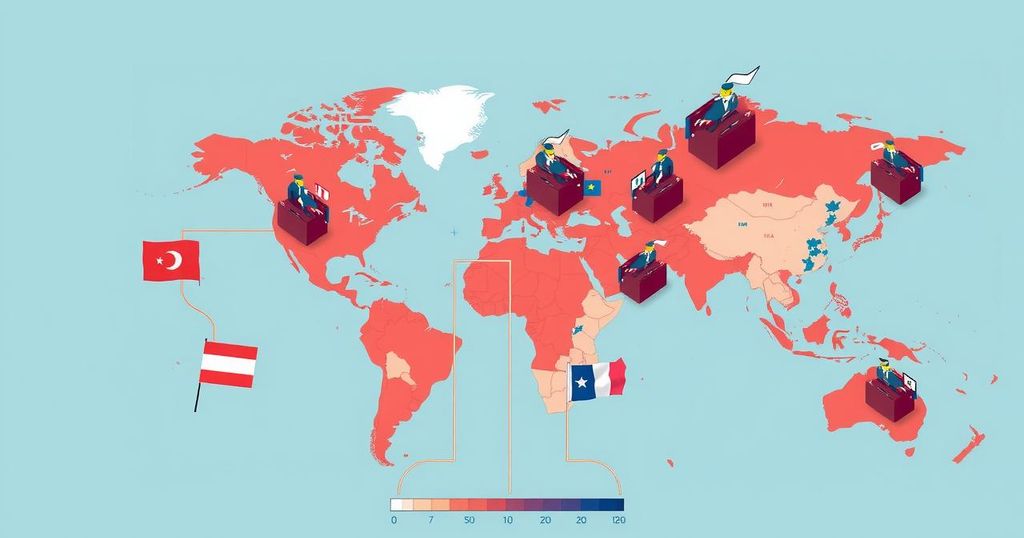2024 Elections: A Year of Transformative Political Changes Worldwide

The year 2024 was marked by elections worldwide, witnessing record voter turnout, significant political change, and notable unrest. Major occurrences included Sheikh Hasina’s falling regime in Bangladesh, Claudia Sheinbaum’s election as Mexico’s first female president, and the annulment of Romania’s presidential election amid accusations of foreign influence. Despite troubling trends like suppressed votes in Russia and Venezuela, public commitment to democracy remains strong, reflecting a resilient global spirit.
The year 2024 was pivotal for elections worldwide, marked by unprecedented voter turnout and significant political shifts. In December, it was reported that Sheikh Hasina won the general election in Bangladesh for the fourth consecutive time, yet faced insurmountable protest, leading to her fleeing to India amidst deadly clashes. Similarly, Claudia Sheinbaum made history as Mexico’s first female president, while Iran experienced a political shift following the death of Ebrahim Raisi, marking the emergence of reformist Masoud Pezeshkian.
Romania witnessed the annulment of its presidential election due to alleged foreign interference promoting far-right candidates. Meanwhile, India recorded a staggering 642 million voters, establishing wins for Prime Minister Narendra Modi’s coalition. The year also marked a turning point for the Conservative Party in the UK after 14 years in power, as well as the historic loss of the African National Congress in South Africa and Botswana’s long-standing ruling party.
In stark contrast, several countries such as Russia, Syria, and Venezuela showcased elections marred by allegations of suppression and protest, with Vladimir Putin and Bashar al-Assad claiming victories amid highly contested environments. The United States saw a surprising election outcome with Donald Trump reclaiming the presidency.
Other notable elections included those in Taiwan, where tensions with China influenced the outcome favorably for the Democratic Progressive Party. In South Sudan, the government postponed elections, citing ongoing conflicts, while Ireland experienced its lowest voter turnout in decades. The Global State of Democracy Report indicated a worrying trend of declining electoral quality for one in three voters worldwide.
Nonetheless, a silver lining is present as public interest in and advocacy for democracy appears resilient, reflecting a deep-rooted commitment to democratic principles. “The main positive takeaway is that people around the world still really care about democracy as a theory but also the way democracy is practiced in their countries and they’re willing to stand up and fight for it,” noted Dr. Seema Shah, emphasizing the ongoing fight for democratic values.
In conclusion, the elections of 2024 served as a litmus test for democracy and governance globally, highlighting both significant progress and alarming challenges. The emerging desire for reform and democratic engagement indicates that citizens remain vigilant and proactive in shaping their political landscapes despite the vulnerabilities faced.
The year 2024 encapsulated a sweeping range of electoral events globally, showcasing a diverse tapestry of political dynamics. From significant electoral victories to tumultuous protests and shocking outcomes, the political landscape has been reshaped. Countries navigated the intricacies and challenges of governance, democracy, and public sentiment, revealing a complex interaction between voters and political entities. As countries grappled with their democratic practices, the collective narrative underscored the critical importance of voter participation and the challenges posed by political unrest.
In summary, the 2024 elections were significant, revealing a mix of triumph and turmoil in democratic processes across the globe. While many nations demonstrated a commitment to electoral participation and historical change, challenges such as suppression, protest, and allegations of interference raised critical questions about the integrity of these democratic practices. The global trajectory indicates a persistent quest for democratic expression, underscoring the need for continued focus on electoral quality and citizen engagement moving forward.
Original Source: news.sky.com








